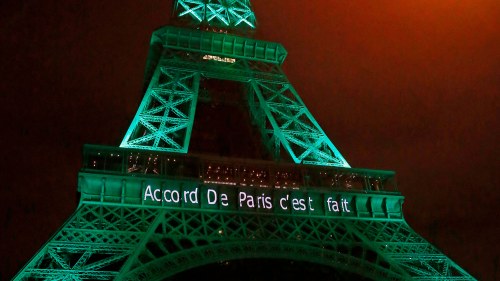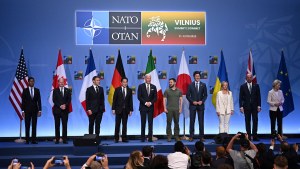Americans Broadly Favorable to Participating in International Agreements

The public supports US participation in the Paris climate agreement, the Iran nuclear deal, and more.
Signing and upholding international agreements has long been considered a key pillar in US foreign policy. But the US role as a galvanizing force to organize international action is not unidirectional. While the United States has been a driving force for international agreements on climate change, it has negotiated and then withdrawn from others—most notably the Iran Deal and the Trans-Pacific Partnership (TPP).
According to data from the 2023 Chicago Council Survey—conducted September 7-18, 2023—the American public is broadly in favor of US participation in an array of international agreements, ranging from the Paris Agreement on climate change to a hypothetical agreement on placing limits on the use of artificial intelligence for military applications. Moreover, bipartisan majorities favor US participation in three of four potential agreements included in the survey, despite often disagreeing on other aspects of the issue at hand.
Limiting Artificial Intelligence
While work surrounding artificial intelligence (AI) has been taking place for years, the issue gained new significance in 2023 as tools became available to bring AI into the every day lives of average Americans. The Biden administration recently signed an executive order that requires a range of actions to assess the impact AI will have across society. But an actual international treaty has not been discussed and is not likely to be proposed in the near term.
At present, Americans are not particularly focused on AI-related concerns. Just 14 percent cite artificial intelligence as their top concern in possible threats to humanity. Nevertheless, the American public favors the United States participating in a treaty that limits the development of artificial intelligence and its uses for military purposes. Seven in 10 (70%) say the United Should participate, including 67 percent of Republicans, 78 percent of Democrats, and 66 percent of Independents.
Paris Agreement
The Paris Agreement on climate change was adopted in December 2015 by 196 countries and then entered into force in November 2016. The agreement aims to limit the increase in global average temperatures to two degrees Celsius above pre-industrial levels. Overall, the agreement is broadly supported by the American public, with 68 percent saying the United States should participate. That number has been relatively steady since the question was first asked in 2016 when 71 percent said the same.
But that overall agreement masks deep partisan divides. While 88 percent of Democrats favor participation in 2023—largely unchanged since 2016—just 45 percent of Republicans agree. This gap likely derives in part from the messaging of Republican leadership on the issue. When the agreement was first asked about in 2016, a majority of Republicans (56%) favored participation in the agreement, but that dropped to 36 percent in 2017 and has remained a minority ever since.
The lack of Republican support may also be due to the very different views that everyday Republicans hold on the dangers of climate change compared to Democrats. In 2023, 52 percent of Americans say climate change is a critical threat facing the United States, but there are deep partisan divides. While 82 percent of Democrats identify climate change as a critical threat, just 16 percent of Republicans say the same. This 66 percentage-point gap is the largest of any potential threat facing the country.
The Iran Deal
The Joint Comprehensive Plan of Action (JCPOA)—otherwise known as the Iran Deal—was negotiated in 2015 and lifted some international sanctions against Iran in exchange for strict limits on its nuclear program for at least the next decade. The United States was a key party in those negotiations, along with several other countries. But in 2018, Donald Trump unilaterally withdrew the United States from the deal.
When the JCPOA was first negotiated, 60 percent of Americans overall supported US participation in the agreement. That included majorities of Democrats (76%) and Independents (58%) but a minority of Republicans (45%). In 2023, support for US participation is up marginally at 63 percent, but a record-high number of Republicans (55%) now favor US participation. Three-quarters of Democrats (74%) and 61 percent of Independents continue to support participation in the Iran Deal.
Interestingly, the continued overall support for participation in the Iran Deal comes as perceptions of Iran’s nuclear program as a critical threat facing the United States are at or near all-time lows. Overall, 49 percent of Americans say Iran’s nuclear program is a critical threat, matching the previous all-time low set in 2020. This includes 56 percent of Republicans (similar to their record low of 54 percent in 2020), a record-low 45 percent of Democrats, and a record-low 46 percent of Independents.
The International Criminal Court
Established in 2002 by the Rome Statute, the International Criminal Court (ICC) is tasked with investigating and prosecuting war crimes, genocide, and other crimes against humanity. The ICC was thrust into the spotlight most recently when Russia’s Vladimir Putin was charged with war crimes stemming from Russia’s invasion of Ukraine. While the ICC has 123 participating countries, the United States is a notable exception.
Even though the United States is not a participant in the ICC, the American public has long supported US participation. In 2023, 74 percent of Americans say the United States should participate in the agreement on the ICC that can try individuals for war crimes, genocide, or crimes against humanity if their own country will not try them. There is little variation by party affiliation. This support for participation has changed little since the question was first asked in 2002. At that time, support was 71 percent and strongly bipartisan.
The Comprehensive and Progressive Agreement for Trans-Pacific Partnership
The Trans-Pacific Partnership (TPP) was a trade agreement negotiated in 2015 by the Obama administration. However, it was never ratified by the US Congress and therefore never brought into force. The Trump administration withdrew the United States from the TPP in 2017 and the agreement was subsequently renamed the Comprehensive and Progressive Agreement for Trans-Pacific Partnership as other signatories moved forward with its implementation without the United States.
The American public is largely favorable toward international trade, and that helps to explain broad support for the CPTPP. Two-thirds of Americans (66%) say the United States should participate in the CPTPP, an all-time high. When the question was first asked in 2018, 61 percent favored US participation. Moreover, majorities of Republicans (56%), Democrats (76%), and Independents (65%) are now in favor. That was not always the case. In 2018, just a minority of Republicans (44%) were in favor.
This analysis is based on data from the 2023 Chicago Council Survey of the American public on foreign policy, a project of the Lester Crown Center on US Foreign Policy. The 2023 Chicago Council Survey was conducted September 7-18, 2023 by Ipsos using its large-scale nationwide online research panel, KnowledgePanel, in both English and Spanish among a weighted national sample of 3,242 adults aged 18 or older living in all 50 US states and the District of Columbia. The margin of sampling error for the full sample is ±2.0 percentage points. The margin of error is higher for partisan subgroups or for partial-sample items.
Partisan identification is based on how respondents answered a standard partisan self-identification question: “Generally speaking, do you think of yourself as a Republican, a Democrat, an Independent, or what?”
The 2023 Chicago Council Survey is made possible by the generous support of the Crown family, the Korea Foundation, and the United States-Japan Foundation.


Related Content
 Public Opinion
Public Opinion
Although the Biden administration has taken steps to address climate change, US policymakers and elites are split on the issue's threat level.
 Public Opinion
Public Opinion
Poll finds a majority of Americans value the US security partnership with Israel but say the status quo between Israel and Palestinians is unacceptable.
 Human Rights
Human Rights
The recent ICC arrest warrant for Putin has sparked global attention, but what about the children abducted during conflict?
 Public Opinion
Public Opinion
As the war in Ukraine continues, majorities say the United States should maintain or increase its commitment to NATO.